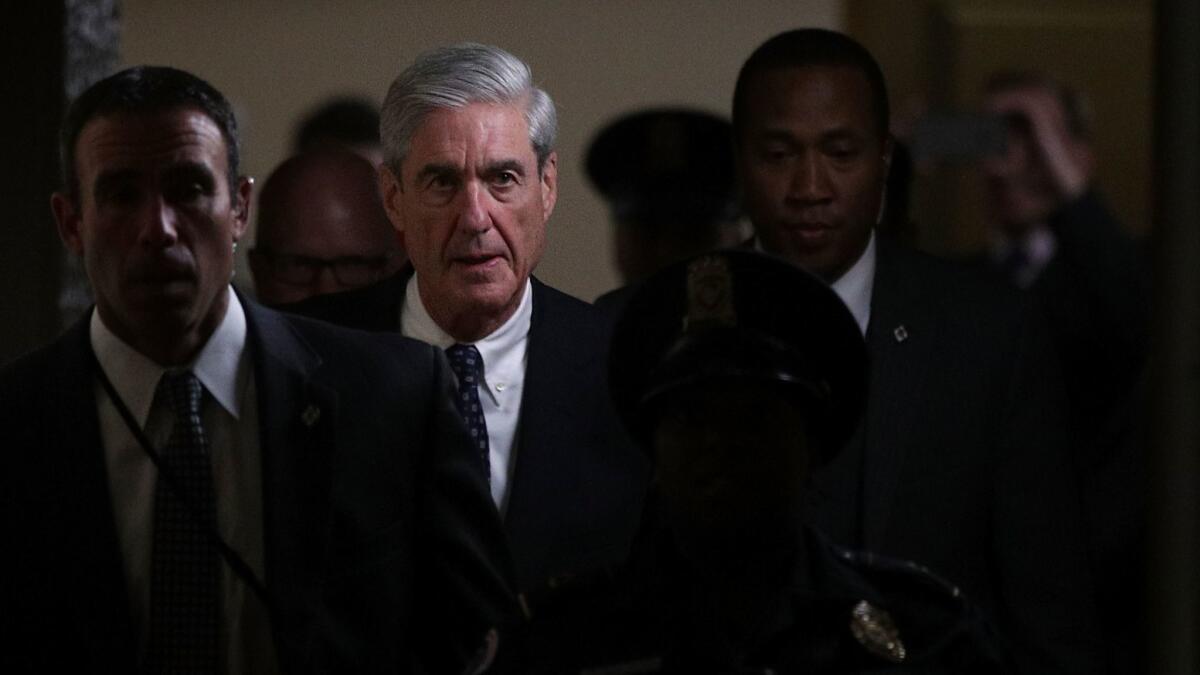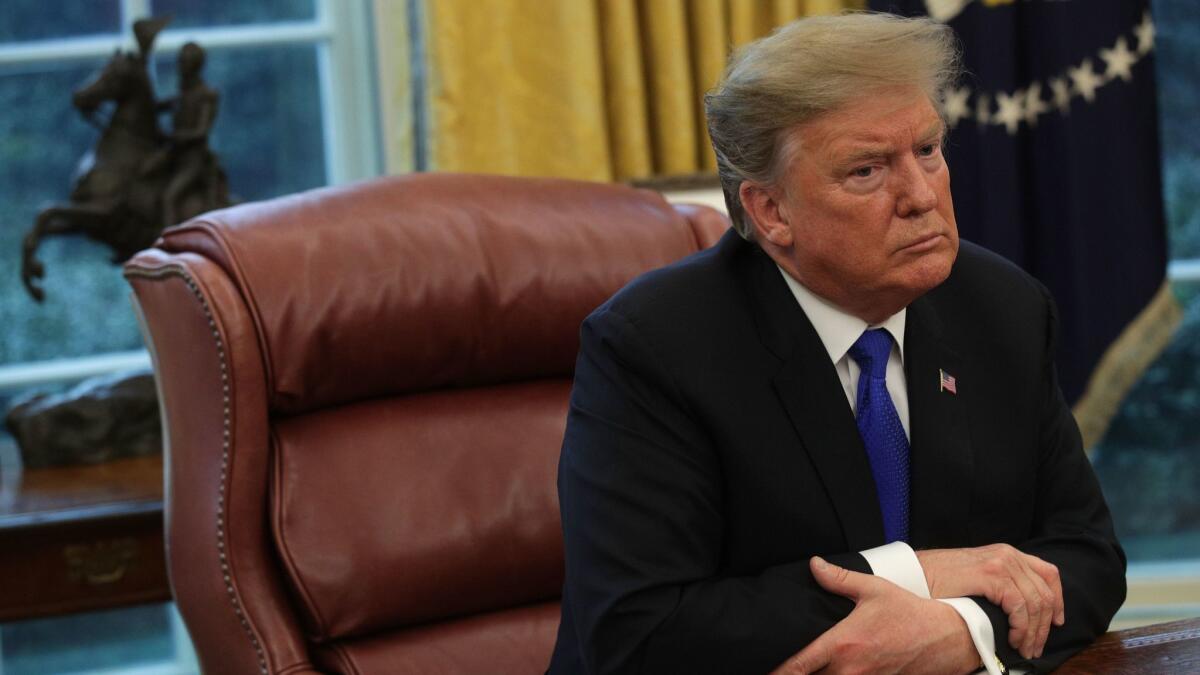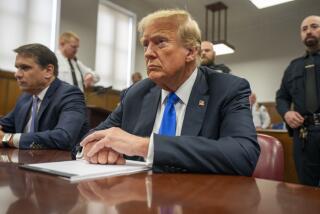Washington on high alert for Mueller report but uncertainty surrounds what happens next

Reporting from Washington â Over nearly two years, special counsel Robert S. Mueller III has operated like a prosecutorial submarine, abruptly surfacing without warning to release indictments or announce guilty pleas and then plunging back down to continue the Russia investigation.
He is ubiquitous and yet invisible â the last known photograph of Mueller was snapped last summer. He has given no interviews, a reticence that has only stoked anticipation for his final report, which appears imminent.
But Muellerâs unremitting silence and the little-used federal law under which he operates have left deep uncertainty about what lies ahead.
Under regulations written in 1999, the special counsel is required to submit a confidential report to the U.S. attorney general when he completes his probe. Everything else about the process â What will he say? How much will he write? When will it be filed? Will it become public? â is a matter of speculation, leaving official Washington on edge.
âNo one really knows or can predict with any uncertainty how this is going to play out,â said Andrew Coan, a University of Arizona law professor who has written a book about presidential investigations. âNot only do we not know what the attorney general is going to do with Robert Muellerâs report, we donât know what Robert Muellerâs report is going to look like.â
Mueller has given no indication of whether he thinks President Trump obstructed justice, one of the focuses of the probe. Trump almost certainly will not face criminal charges because Justice Department guidelines bar a sitting president from being indicted, however.
TIMELINE: The biggest indictments, guilty pleas and dramas in the Russia investigation Âť
Still, Muellerâs report could include an incriminating description of Trumpâs actions, or even a road map that could be used for impeachment proceedings. Or neither, giving the president the legal and political vindication he has long claimed he is due.
Trump, of course, has already made up his mind about what the Mueller report should say.
âThere was no collusion. There was no obstruction. There was no anything,â he told reporters in the Oval Office on Friday. âIf itâs an honest report, it will say that. If itâs not an honest report, it wonât.â
Some in Trumpâs orbit say his angry tweets about the investigation â heâs condemned it as a hoax or worse hundreds of times â are a signal that heâs bracing for bad news.
âHe tends to go back and forth, where one minute heâs upset and tweeting about the âwitch huntâ and the next heâs telling you, âItâs going to be fine,â which is basically him telling himself,â said a White House aide, who spoke on condition of anonymity to discuss the presidentâs mindset.
âThe big question is how he responds once it hits,â the aide added. âNo one can really plan for that because no one knows whatâs coming.â
Trumpâs legal team has prepared a rebuttal to Muellerâs report. But they donât know what they will release because they donât know what Mueller will say.
One Trump confidant argues that anything less than an overt criminal conspiracy will exculpate Trump in the public eye.
âI think the nation is exhausted of the topic,â said Matt Schlapp, chairman of the American Conservative Union and husband of Mercedes Schlapp, the White House director of strategic communications. âAnd I think anyone who is a fair-minded voter will look at anything short of Russian collusion as a distraction.â

FULL COVERAGE: Robert Mueller finishes his investigation into President Trumpâs 2016 campaign Âť
The special counsel regulations offer little guidance on what to expect. They state that the special counsel âshall provide the attorney general with a confidential report explaining the prosecution or declination decisions,â meaning the decisions not to press charges.
The attorney general is required to notify Congress of any situations in which he overruled the special counsel â for example, if he refused to approve a particular indictment or subpoena. He also can decide that âpublic release of these reports would be in the public interest.â
That means the key figure in coming weeks may be William Barr, Trumpâs new attorney general â not Mueller.
During his Senate confirmation hearing, Barr pledged to âprovide as much transparency as [he] can consistent with the lawâ regarding the Mueller report, but stopped short of promising to release it to the public.
Democrats have demanded the entire report be published. Now that they control the House, they could issue subpoenas to try to pry it out of the Justice Department.
âTo maintain that a sitting president cannot be indicted, and then to withhold evidence of wrongdoing from Congress because the President will not be charged, is to convert [Justice] Department policy into the means for a cover-up,â the chairs of six House committees complained in a letter to Barr on Friday. âThe President is not above the law.â
David Bossie, a conservative activist who worked on Trumpâs 2016 campaign and now serves as an outside advisor to the president, said Democrats may face a backlash if they make too much out of a report that is not damning to the president.
âBecause when you overreach, there is inevitably a boomerang,â he said. âYou will embolden and empower the president, rather than weakening him.ââ
Itâs a far different scenario than when the independent counsel wrapped up his investigation into President Clinton in 1998.
Kenneth Starr operated under rules that made him answerable only to a panel of judges, not to the attorney general, and that required him to provide a report to Congress.
He gave them a salacious, detailed account of Clintonâs affair with a White House intern and allegations that he obstructed justice and lied under oath. The report became the basis for Clintonâs impeachment in the House, although he was acquitted in the Senate and served out his term.
Believing Starr had too much leeway, Congress allowed the independent counsel statute to expire and new rules were drawn up â the ones under which Mueller now operates â to provide greater supervision for future investigations.
Mueller already has produced a thick pile of court documents outlining Moscowâs meddling in the 2016 campaign, including the hacking of Democratic Party emails and spreading of misinformation on social media. He has indicted 25 Russians, some of them military intelligence officers, on allegations of violating U.S. law.
He also has exposed a tidal wave of lying by Trump aides, including his former national security advisor, campaign chairman, personal lawyer and others, frequently in connection with their communications with Russian officials or suspected operatives. In all, six former Trump aides or associates have pleaded guilty to various charges.
âItâs a remarkable investigation,â said former acting FBI Director Andrew McCabe, who launched the obstruction investigation aimed at Trump and was later fired. âAnd itâs one thatâs produced tangible, meaningful results. And I think that alone justifies and validates our initial fears, our initial concerns.â
Some questions remain unanswered, most recently involving Roger Stone, a former political advisor to Trump. The indictment said someone directed an unnamed Trump campaign official to reach out to Stone to discuss WikiLeaksâ plans for hacked Democratic Party emails.
âThere are some really important parts of the puzzle that Mueller has engaged with but not come to ground with,â said Harry Litman, a University of California law professor and former federal prosecutor.
Mueller appears to have given up efforts to interview Trump, which he had sought for months. In the end, the president answered written questions submitted by Muellerâs team, and only about issues that took place before his inauguration, claiming executive privilege.
There are plenty of signs that Mueller is winding down. Several investigations have been handed off to other offices, and some of his prosecutors have returned to their previous positions at the Justice Department.
Media reports this week variously said Mueller would hand in his report as early as next week or in âthe coming days.â Then a Justice Department official told news outlets Friday that nothing would be announced next week.
But the exact timing remains as unclear as ever.
âIt had to be before Labor Day. It had to be right after the [midterm] election,â said David Wade, who works for two advocacy groups dedicated to the Russia probe. âThe one thing thatâs been a constant is there are limits to how much any of us can speculate.â
More to Read
Get the L.A. Times Politics newsletter
Deeply reported insights into legislation, politics and policy from Sacramento, Washington and beyond. In your inbox three times per week.
You may occasionally receive promotional content from the Los Angeles Times.













